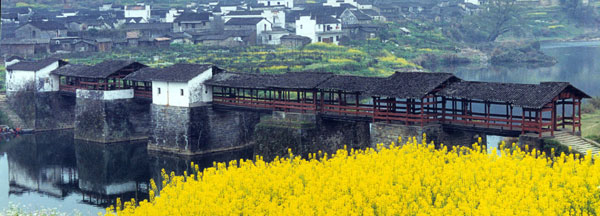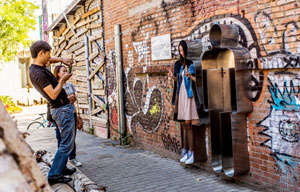Hillsides of gold, red and white
Wuyuan, a county set in the mountains of Jiangxi province, is an ideal place to slow down, wander among old homes and smell the flowers. Zhang Zixuan checks out the scenery.
If there's one place that evokes the tranquil beauty of Chinese ink painting, it is Wuyuan. The county in northeastern Jiangxi province, dubbed "China's most beautiful countryside", features hills dotted with black and white homes.
 |
|
Wuyuan, in Jiangxi province, is known for its idyllic landscape and abundance of cultural relics, like this roofed bridge dating to the Song Dynasty (960-1279). Photo provided to China Daily |
Established in the Tang Dynasty (AD 618-907), Wuyuan is one of the cradles of Huizhou culture, which was nurtured by booming trade and featured strong influences of clans and Confucianism. The county's distinctive homes, built in the style of Huizhou architecture, have black roofs and white walls.
The walls themselves are inlaid with black bricks shaped like horse heads, hence the name "horse-head walls". With the passage of time, rain and moisture have penetrated the white walls and have given them the watered down look of ink paintings.
In strict accordance with tradition, the brick and wood structures are decorated with exquisitely handcrafted wood, brick and stone sculptures, now considered State-level intangible cultural heritage pieces.
Homes are interspersed with ancestral temples, showing the residents' respect and pride for their community's history. The buildings are also constructed at different heights to prevent fires from quickly spreading.
Visiting Wuyuan feels like going back in time, to an era when the pace of life was slower and people lived closer to nature. Besides its signature architecture, the county is also known for its fields of cole flowers.
In spring, their golden petals blanket the horizon. In Jiangling village, the blossoms cover curved terraces, like luxurious brocade, cascading from hilltop to valley.
When autumn comes, the flowers paint the land a fiery red. In the village of Huangling, the scarlet in the landscape is accented by the hundreds of chilies laid out to dry in wicker baskets, which sit on wooden rods jutting out of homes.






















